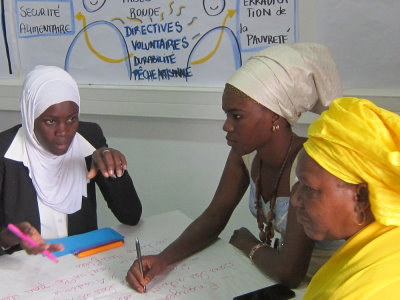 Sperimentare metodi di formazione durante la fase pilota dell'Accademia della pesca artigianale (SSF) in Senegal Readers ricorderà il lancio dell'Accademia in Senegal alla fine del 2018 come contributo concreto all'attuazione delle Direttive SSF (SSF Guidelines). Un folto gruppo di uomini e donne provenienti da tutti i segmenti del settore e da tutte le regioni del paese, amministratori di settore e accademici hanno assicurato un'ampia adesione all'idea e sviluppato raccomandazioni per le attività. Il prossimo passo
Sperimentare metodi di formazione durante la fase pilota dell'Accademia della pesca artigianale (SSF) in Senegal Readers ricorderà il lancio dell'Accademia in Senegal alla fine del 2018 come contributo concreto all'attuazione delle Direttive SSF (SSF Guidelines). Un folto gruppo di uomini e donne provenienti da tutti i segmenti del settore e da tutte le regioni del paese, amministratori di settore e accademici hanno assicurato un'ampia adesione all'idea e sviluppato raccomandazioni per le attività. Il prossimo passo
era stata l'istituzione del primo Comitato dell'Iniziativa, il 24 marzo 2019. Da allora, le attività pilota per la sperimentazione metodologica e lo sviluppo del curriculum sono iniziate sul serio in tempo per la Giornata mondiale dell'oceano, l'8 giugno 2019, con visite ai comitati locali a sostegno i primi allenamenti di prova a Yoff e Hann. Entrambi i villaggi di pescatori sono molto diversi nei tipi di pesca e nell'organizzazione sociale in modo da fornire un buon terreno di apprendimento.
Introduction
The SSF academy is intended to serve as a safe multi-actor platform for free and respectful exchanges, co-learning and co-production of knowledge and innovations for marine protection, the sustainable use of marine and coastal resources and sustainable and prosperous artisanal fisheries. The Academy presents itself as an opportunity for articulations between the Global Sustainable Development Goals (SDGs) and local action which respects the expectations of the populations concerned. In a world of globalised markets, climate change and other challenges, bringing together different sources of knowledge and perspectives opens up new opportunities for collective action in search of maintaining or acquiring good quality of life and living in harmony with nature. To this end, Mundus maris has supported the first development steps of the academy with the testing of visual participatory training methods.
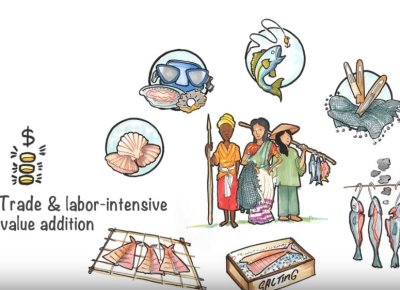 The SSF Guidelines provide guidance on the development and implementation of policies, legislation and legal and institutional frameworks for the sustainability of small-scale fisheries at the social, economic and environmental levels. The World Bank assumes that of the 120 million people working globally in various segments of fisheries and aquaculture, 97% are active in SSF and approximately 50% of all people employed or some 56 million are women.
The SSF Guidelines provide guidance on the development and implementation of policies, legislation and legal and institutional frameworks for the sustainability of small-scale fisheries at the social, economic and environmental levels. The World Bank assumes that of the 120 million people working globally in various segments of fisheries and aquaculture, 97% are active in SSF and approximately 50% of all people employed or some 56 million are women.
In Senegal, the sectoral policy for the development of fisheries and aquaculture over the period 2016-2022 and the National Climate Change Adaptation Plan for Fisheries and Aquaculture (NAP-Fisheries) inspire an approach of owning up to the guiding principles and recommendations of the SSF Guidelines. They recognise the key role of women in small-scale fisheries and the need for their preferential treatment in order to achieve equitable incomes.
The SSF guidelines identify the principal contributions of women to the household economy (chapter 4) as follows:
- Domestic work, such as household chores (such as cooking and cleaning) and caregiving - including not only childcare, but also caring for the sick and elderly, which may involve up to four extra hours daily work (Montfort, 2015);
- Pre-harvest work, including bait collection and preparation, net repair, food preparation for fishing trips, and book and bookkeeping;
- Post-harvest work, including home work such as cleaning, sorting or processing fish.
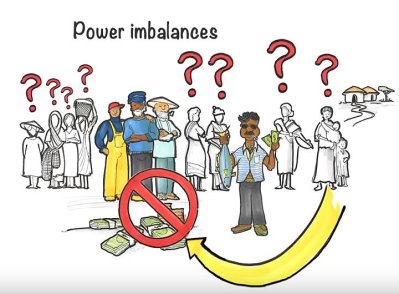 These contributions are frequently unrecognised and considered simple extensions of household chores. They are rarely, if ever, adequately remunerated. Decent working conditions are often not ensured. Domestic violence is believed to be a more widespread problem than publicly acknowledged. Chapter 6 of the SSF Guidelines recommends institutional responses to reign in such abuses.
These contributions are frequently unrecognised and considered simple extensions of household chores. They are rarely, if ever, adequately remunerated. Decent working conditions are often not ensured. Domestic violence is believed to be a more widespread problem than publicly acknowledged. Chapter 6 of the SSF Guidelines recommends institutional responses to reign in such abuses.
In the community space, women often carry out most of their activities related to culture and their income earning needs (chapter 3 of the SSF Guidelines):
- Pre-harvest work, such as bait collection and preparation, net repair and repair of canoes and other boats. These forms of work are not reflected in social statistics;
- Harvesting: When combining data on the fisheries and aquaculture sectors, about 19 percent of the harvest is ensured by women (FAO, 2018). In most areas, women's harvesting activities are an essential source of food and nutrition for their families as well as for income;
- Post-harvest work: Women in SSF work mainly in the post-harvest sector in a variety of roles: selling and trading fish, processing fish (salting, drying, pickling and smoking), or sorting waste at landing sites.
Women are generally not equitably treated in these income earning activities either. Some legal, religious or traditional social rules of communities may maintain such discrimination.
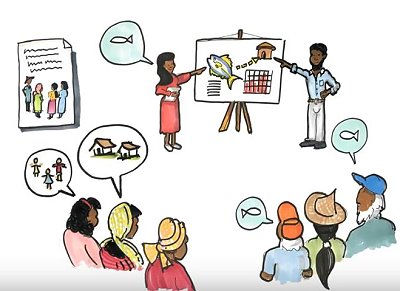 These structures and practices, however, are not intractable; they yield to pressure and changing circumstances and evolve over time. Such manifestation of gender inequality have also changed from one historical moment to another. Discriminatory laws, policies, customs and practices may therefore be challenged. All institutional arrangements that constitute a society, from marriage and the family to governance at different levels (as well as the resulting institutional practices) can be subjected to scrutiny and transformation with a view to eliminating gender inequalities (SDG 5). This idea is at the heart of the concept of gender mainstreaming in all policy initiatives and decisions, and the SSF Academy as a support initiative for the implementation of the guidelines, which address gender equity in chapter 8 more in detail.
These structures and practices, however, are not intractable; they yield to pressure and changing circumstances and evolve over time. Such manifestation of gender inequality have also changed from one historical moment to another. Discriminatory laws, policies, customs and practices may therefore be challenged. All institutional arrangements that constitute a society, from marriage and the family to governance at different levels (as well as the resulting institutional practices) can be subjected to scrutiny and transformation with a view to eliminating gender inequalities (SDG 5). This idea is at the heart of the concept of gender mainstreaming in all policy initiatives and decisions, and the SSF Academy as a support initiative for the implementation of the guidelines, which address gender equity in chapter 8 more in detail.
It is against this backdrop that the first two tests of training methods helping men and women to articulate better their aspirations, needs, constraints and opportunities for collaborative success were conducted in Yoff and Hann.
Sketches are taken from the FAO Video about the gender dimension of the SSF Guidelines and depict typical activities, question power imbalances and outline the advantages of equitable participation of women and men who bring complementary skills and visions to prosperous SSF.
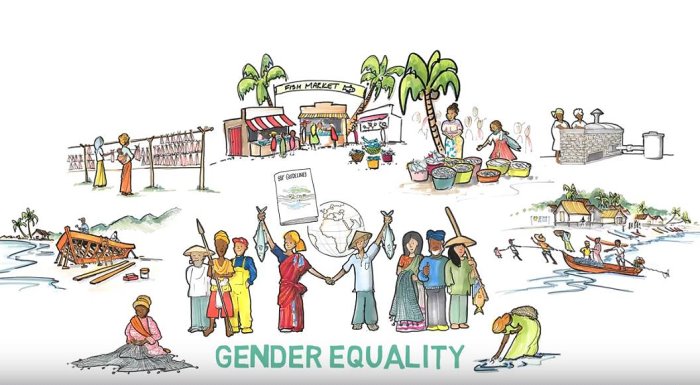
Click here for the Academy flyer.









